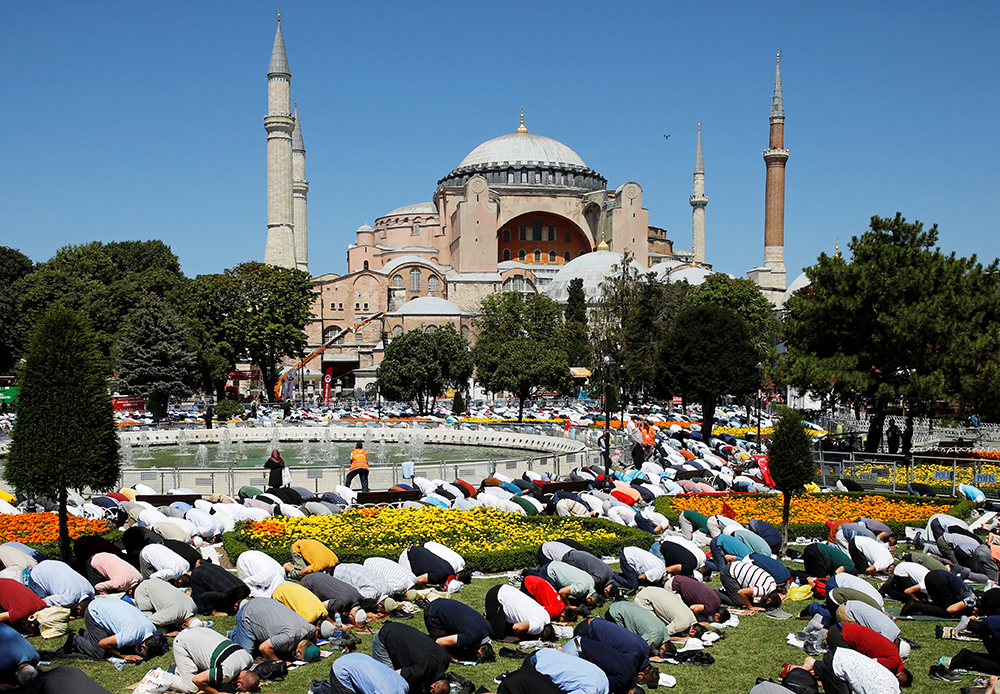
By Engy Magdy, Special to The Tablet
CAIRO — It has been six months since Turkey president Recep Tayyip Erdogan turned the UNESCO world heritage site Hagia Sophia (the cathedral built by Emperor Justinian I in 532) into a mosque and four months since he made a similar conversion of the historic Church of the Holy Saviour in Chora.
Because of Erdogan’s controversial steps and poor record on protecting minority cultures, a recent “Cultural Property Agreement” between the United States and Turkey has attracted stark criticism among the Greek and Armenian communities in the U.S. and other countries who are asking President Biden’s administration not to enforce the memorandum of understanding (MoU).
The agreement, which was completed by the Trump administration one day before he left office, aims to combat cultural property trafficking and to preserve heritage items by allowing the U.S. to establish import restrictions on certain categories of Turkey’s cultural property.
A last-minute agreement
The fact that the agreement was concluded in the very last minutes of the Trump Administration has raised some controversy.
“For many people, the agreement was received as a U.S. approval to the latest Turkish provocative behavior and rising intolerance towards minorities within the country … We shouldn’t forget that Turkey has recently shown an unprecedented revisionism focused on Islamic nationalism,” Tasos Chatzivasileiou, a member of Greece’s Hellenic Parliament told The Tablet.
Chatzivasileiou acknowledges that the agreement itself would be a positive step if the Turkish government would abide by its provisions.
However, Chatzivasileiou doesn’t think Turkey intends to comply with it. According to the Greek parliamentarian, it has been pointed out by some analysts that during the Syrian war, ISIS traffickers have illegally smuggled a considerable number of ancient artifacts through Turkey.
Some analysts fear Erdogan’s government would use the agreement to advance Islamic nationalism and erase its own minorities’ cultural heritage.
They claim that the cultural artifacts of the minorities that do not correspond to the Islamic tradition that modern Turkey desires to promote were not duly protected.
Loss of cultural heritage
According to the Religious Freedom Institute (RFI), a brief inventory of the Turkish state’s cultural heritage moves since the start of this millennium point to the corrosion of institutional religious freedom, using state policies and laws as a discriminatory cudgel against religious and ethnic minorities.
“There are innumerable cases of the country’s small Christian communities, and with more frequency, the Jewish and Alevite communities, facing the loss of cultural heritage, whether in tangible or intangible forms, erasing minority religioscapes,” said Elizabeth Prodromou, a visiting Associate Professor of Conflict Resolution at the Fletcher School of Law and Diplomacy at Tufts University, in her article on RFI’s website.
The agreement comes in response to a request by Turkey, submitted over a year ago to the U.S. Department of State to prohibit the United States from importing all Turkish art and ethnographic materials from the Prehistoric Period to 1923, thereby defining Turkey’s cultural heritage according to a timeline that stretches millennia prior to the establishment of the state in 1923.
Prodromou said that last year a constellation of international heritage organizations submitted statements to the State Department in opposition to the proposed MoU, offering an extensive list of evidentiary material indicating that “the Turkish government itself is to blame for much of the looting, lack of preservation, and destruction of Turkey’s rich cultural heritage,” mentioning the record of particular prejudice in heritage management towards the religious patrimony of the country’s Armenian, Greek, Syrian Christian, and Jewish populations.
On Jan. 16, the Turkish news site Gazete Duvar published a report about a historic Armenian church in Bursa that was put up for sale for around $850,000. The name and location of the church were not shared in the advertisement, but the site reported that the church is in a location in a region included in the UNESCO World Heritage List.
Also, last October, Mardin Artuklu John’s Church in the town of Mora was also put up for sale.
Biden administration
Armenian and Hellenic organizations rallied against the signing of the MoU as the American Hellenic Institute called upon the Biden administration not to enforce it.
“The minority Christian communities in the United States are upset by these fake claims of ownership. They have protested to the State Dept. As the Biden Administration is new, it will be contacted shortly,” Harut Sassounian, the publisher of an English-language Armenian weekly newspaper California Courier, told The Tablet.
“Our concern is that Turkey will claim ownership of the antiquities that are owned by the Christian minorities who have lived in what is now Turkey for a couple of millennia. Any items belonging to these Christian minorities currently located in museums or even churches belonging to these minorities around the world can be claimed by Turkey as belonging to it, according to this agreement,” he added.
It’s not clear whether the Biden administration will revise the MoU in any way. The U.S. Department of State declined to reply to The Tablet’s questions on the issue. The press office replied to our email by referring us to the announcement of the MoU.
“I understand that Biden’s Administration will be eager to monitor the application of the memorandum. President Biden has shown particular sensitivity to art and culture issues and the US position on the Bosphorus University is already showing a significant change of the American diplomacy, focusing on cultural and democratic affair,” Chatzivasileiou said.
“Nevertheless, even if one can agree that the signature of the MoU has been hasty, I believe that the memorandum could be eventually used in order to promote the respect and protection of all cultural heritage of modern Turkey, no matter its historical, ethnic or religious origin. Greeks expect, from all international partners, to respect Christian heritage and implement international law. UNESCO should monitor the whole situation,” he suggested.
